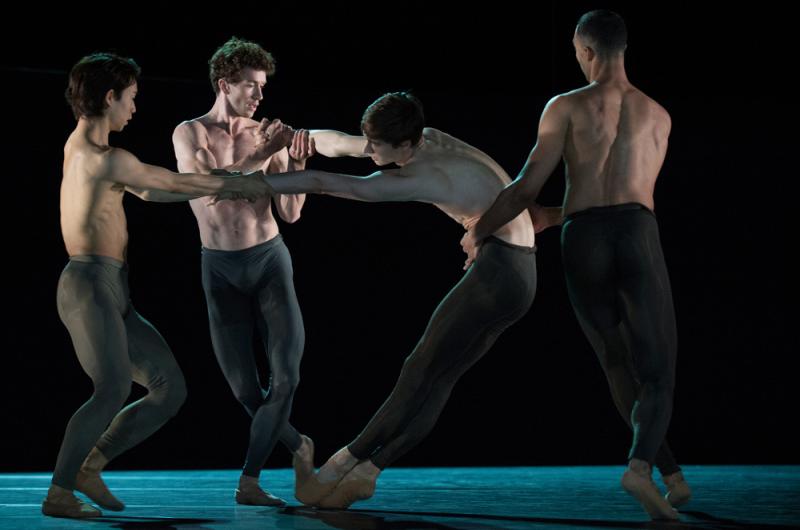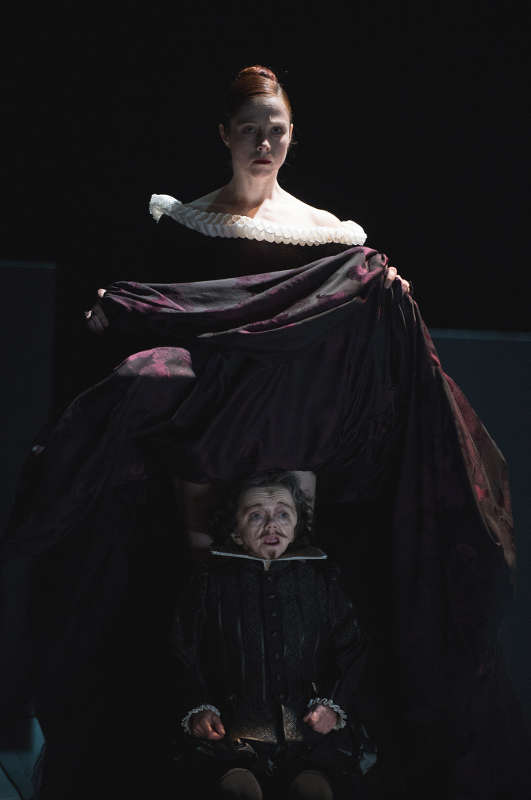McGregor/Spuck, Ballett Zürich, Edinburgh Playhouse | reviews, news & interviews
McGregor/Spuck, Ballett Zürich, Edinburgh Playhouse
McGregor/Spuck, Ballett Zürich, Edinburgh Playhouse
Contemporary dance formula ticks boxes, but fails to inspire

New Edinburgh Festival director Fergus Linehan has made it clear he wants to offer things people actually want to see. So including Wayne McGregor - prolific, popular, energetically self-promoting doyen of contemporary dance - in the dance programme for the first time makes plenty of sense.
That Kairos had been created for Ballett Zürich alongside a piece by director Christian Spuck based on Shakespeare's late sonnets was the icing on the programming cake: the EIF loves European collaboration, and Spuck is unforgettable to the Edinburgh audiences who saw his wacky Return of Ulysses by the Royal Ballet of Flanders at 2009's Festival. A reliable formula, then, but was it a winner?
The thing about a formula is that you know what you're getting. If you like Wayne McGregor and Max Richter, it's safe to say you'll like Kairos. The recomposed Four Seasons reduces, abstracts and repeats Vivaldi's hummable themes over spacey electronic soundscapes, and its driving rhythmicality provides the perfect backdrop for the trademark spiky speed of McGregor's choreography, though Vivaldi provides slower themes as well, provoking McGregor to produce lyrical, almost elegant passages – particularly striking for five men (main picture), who disport themselves serenely like fauns in a Greek sacred grove.
 Ballett Zürich has crisp, clean, committed dancers, and – as is usual with McGregor ventures – the design package is slick and beautifully executed: a smoky metallic curved wall by Idris Khan serves as the backdrop, elegant briefs and vests by Moritz Junge are as pretty as grey underwear goes, and Lucy Carter's lighting design is full of sculpturally deep shadows. Everyone is in their comfort zone. Everyone except those, who, like me, are tired of the formula, and for whom extreme hyperextensions, frisson-less pas de deux, and rhythm instead of musicality show neither McGregor, nor the classical ballet companies he works with, at their best.
Ballett Zürich has crisp, clean, committed dancers, and – as is usual with McGregor ventures – the design package is slick and beautifully executed: a smoky metallic curved wall by Idris Khan serves as the backdrop, elegant briefs and vests by Moritz Junge are as pretty as grey underwear goes, and Lucy Carter's lighting design is full of sculpturally deep shadows. Everyone is in their comfort zone. Everyone except those, who, like me, are tired of the formula, and for whom extreme hyperextensions, frisson-less pas de deux, and rhythm instead of musicality show neither McGregor, nor the classical ballet companies he works with, at their best.
Spuck's formula I know less well, but it includes a penchant for slapstick: The Return of Ulysses featured a man in flippers, snorkel and tutu, Le Grand Pas de Deux a ballerina in spectacles. Sonnett (2014) deals with Shakespeare's "Dark Lady" sonnets, and isn't played for laughs, but Spuck still homes in on love's ridiculousness through a contrast of scale: the stage is dominated by a huge backdrop half-portrait of a young man, while statuesque Eva Dewaele sweeps around dramatically, a Dark Lady in a voluminous dark dress, and the bard himself is played by French actress Mireille Mossé (pictured above right with Dewaele), whose small scale and relatively high voice present the poet as puny mortal next to the outsize figures of his passionate imagining. The Dark Lady's repeated but silent movements, and the 2D young man's immobility, contrast too with Mossé's frequent speeches and nervous journeys around the stage. Sometimes she's even pushed by the dancers, or admonishes them to stop what they're doing, but they continue on their way, oblivious to the concerns of the central trio.
It's a convincing and darkly comic picture of the way obsessive love can distort our view of the world we inhabit, but regrettably it's not much fun to watch or listen to; a movement of Philip Glass's symphony No 8 and Mozart's Adagio for glass harmonica are more or less wallpaper, Mossé's recitation of Shakespeare is rendered alienating by the need to flick between its French delivery and projected subtitles, and little of the dance is memorable, with the exception of the splendidly whirling blue-coated chorus figures (Wei Chen, Andrei Cozlac and Christopher Parker) who display Spuck's talent for vibrantly reimagining classical dance tropes.
I record that the audience in the cavernous Playhouse greeted Kairos with enthusiasm and Sonnett not quite as warmly. I went away rather cold from both.
rating
Explore topics
Share this article
The future of Arts Journalism
You can stop theartsdesk.com closing!
We urgently need financing to survive. Our fundraising drive has thus far raised £33,000 but we need to reach £100,000 or we will be forced to close. Please contribute here: https://gofund.me/c3f6033d
And if you can forward this information to anyone who might assist, we’d be grateful.

Subscribe to theartsdesk.com
Thank you for continuing to read our work on theartsdesk.com. For unlimited access to every article in its entirety, including our archive of more than 15,000 pieces, we're asking for £5 per month or £40 per year. We feel it's a very good deal, and hope you do too.
To take a subscription now simply click here.
And if you're looking for that extra gift for a friend or family member, why not treat them to a theartsdesk.com gift subscription?
more Dance
 Help to give theartsdesk a future!
Support our GoFundMe appeal
Help to give theartsdesk a future!
Support our GoFundMe appeal
 Vollmond, Tanztheater Wuppertal Pina Bausch + Terrain Boris Charmatz, Sadler's Wells review - clunkily-named company shows its lighter side
A new generation of dancers brings zest, humour and playfulness to late Bausch
Vollmond, Tanztheater Wuppertal Pina Bausch + Terrain Boris Charmatz, Sadler's Wells review - clunkily-named company shows its lighter side
A new generation of dancers brings zest, humour and playfulness to late Bausch
 Phaedra + Minotaur, Royal Ballet and Opera, Linbury Theatre review - a double dose of Greek myth
Opera and dance companies share a theme in this terse but affecting double bill
Phaedra + Minotaur, Royal Ballet and Opera, Linbury Theatre review - a double dose of Greek myth
Opera and dance companies share a theme in this terse but affecting double bill
 Onegin, Royal Ballet review - a poignant lesson about the perils of youth
John Cranko was the greatest choreographer British ballet never had. His masterpiece is now 60 years old
Onegin, Royal Ballet review - a poignant lesson about the perils of youth
John Cranko was the greatest choreographer British ballet never had. His masterpiece is now 60 years old
 Northern Ballet: Three Short Ballets, Linbury Theatre review - thrilling dancing in a mix of styles
The Leeds-based company act as impressively as they dance
Northern Ballet: Three Short Ballets, Linbury Theatre review - thrilling dancing in a mix of styles
The Leeds-based company act as impressively as they dance
 Best of 2024: Dance
It was a year for visiting past glories, but not for new ones
Best of 2024: Dance
It was a year for visiting past glories, but not for new ones
 Nutcracker, English National Ballet, Coliseum review - Tchaikovsky and his sweet tooth rule supreme
New production's music, sweets, and hordes of exuberant children make this a hot ticket
Nutcracker, English National Ballet, Coliseum review - Tchaikovsky and his sweet tooth rule supreme
New production's music, sweets, and hordes of exuberant children make this a hot ticket
 Matthew Bourne's Swan Lake, New Adventures, Sadler's Wells review - 30 years on, as bold and brilliant as ever
A masterly reinvention has become a classic itself
Matthew Bourne's Swan Lake, New Adventures, Sadler's Wells review - 30 years on, as bold and brilliant as ever
A masterly reinvention has become a classic itself
 Ballet Shoes, Olivier Theatre review - reimagined classic with a lively contemporary feel
The basics of Streatfield's original aren't lost in this bold, inventive production
Ballet Shoes, Olivier Theatre review - reimagined classic with a lively contemporary feel
The basics of Streatfield's original aren't lost in this bold, inventive production
 Cinderella, Royal Ballet review - inspiring dancing, but not quite casting the desired spell
A fairytale in need of a dramaturgical transformation
Cinderella, Royal Ballet review - inspiring dancing, but not quite casting the desired spell
A fairytale in need of a dramaturgical transformation
 First Person: singer-songwriter Sam Amidon on working in Dingle with Teaċ Daṁsa on 'Nobodaddy'
Michael Keegan-Dolan’s mind-boggling total work of art arrives at Sadlers Wells this week
First Person: singer-songwriter Sam Amidon on working in Dingle with Teaċ Daṁsa on 'Nobodaddy'
Michael Keegan-Dolan’s mind-boggling total work of art arrives at Sadlers Wells this week

Add comment